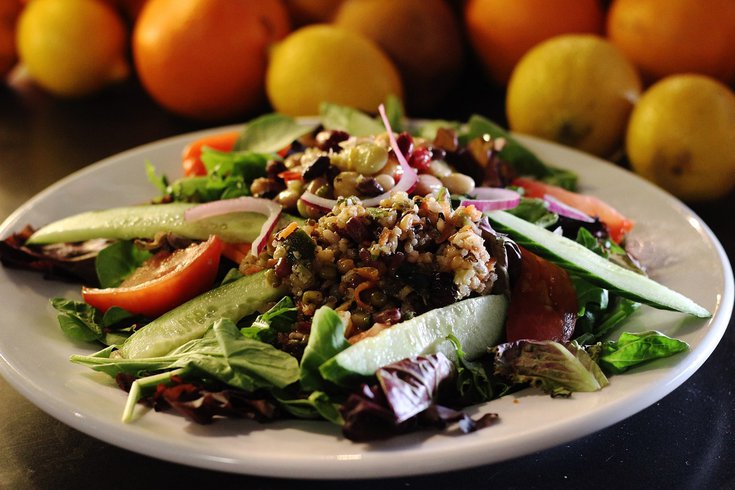
December 27, 2022
 Loucas Loucaides/Pixabay
Loucas Loucaides/Pixabay
The main ingredients of the MIND diet are leafy greens, vegetables, whole grains, beans, nuts, berries, poultry, fish, and olive oil. It has been shown to improve brain health, slow cognitive decline and reduce the risk of Alzheimer’s disease.
Many health experts regard the Mediterranean and DASH diets as two of the healthiest. They have been shown to lower blood pressure and reduce the risk of heart disease, diabetes and other diseases.
So, scientists at Rush University used elements from them to create a diet specifically aimed at boosting brain health. The result, the MIND diet, has been shown to slow cognitive decline and reduce the risk of Alzheimer's disease, the most common form of dementia.
The main ingredients of the MIND diet – which stands for Mediterranean-DASH Intervention for Neurodegenerative Delay – are leafy greens, vegetables, whole grains, beans, nuts, berries, poultry, fish and olive oil.
If you're considering adopting the MIND diet in the new year, here's what you should know.
The brain is particularly vulnerable to inflammation and oxidative stress, which occurs when unstable molecules called free radicals accumulate in large amounts, damaging cells.
One of the biggest potential benefits of the MIND diet is that it can limit age-related memory loss by reducing inflammation and oxidative stress.
The foods emphasized by the MIND diet are rich in vitamins, carotenoids and flavonoids that are brain protective. The antioxidants in berries and the vitamin E in olive oil, green leafy vegetables and nuts are thought to reduce oxidative stress. The omega-3 fatty acids gained from eating fatty fish help lower inflammation in the brain.
The MIND diet also has been shown to reduce amyloid-beta proteins, or plaque, in the brain, which is the hallmark of Alzheimer's disease.
Research investigating the effects of the MIND diet, found that it reduced the risk of memory loss and Alzheimer's disease by 53% among those who rigorously followed it. For people who followed it moderately well, it lowered their risk by 35%.
For the adults whose diet focused mainly on vegetables and berries, their brains performed as well as they did when they were seven years younger.
The MIND diet also has been found to improve overall health, including providing protective heart health benefits. It may help control or prevent diabetes, although further evidence is needed to confirm this.
Rush University researchers stress that when the MIND diet can improve a person's longevity when it is combined with other elements of a healthy lifestyle, like being physically active for at least 150 minutes a week, not smoking, limiting alcohol use and engaging in cognitive activities like reading and doing puzzles.
A study published in the British Medical Journal found that people 65 and older who had a healthy lifestyle lived longer than other seniors. Men lived 5.7 years longer; women lived 3.1 years longer.
Ongoing research at RUSH also shows that lifestyle factors have the potential to reduce the risk for Alzheimer's disease and dementia by up to 60%.
Other studies have suggested that the adhering to the MIND diet may reverse the harmful effects of obesity on cognitive ability and brain structure. And a 2018 study found an association between the MIND diet and reduced risk of Parkinson's disease and delayed progression of its symptoms.
Researchers have not identified any concerning health risks with the MIND diet. People who are looking to rapidly loose weight may want to try another option, because the MIND diet has not been shown to aid rapid weight loss. It also isn't strongly associated with long-term weight loss and lowering waistlines.
To get started on the MIND diet, stock the kitchen with leafy vegetables like arugula, collard greens, kale, lettuce, spinach, Swiss chard and watercress as well as other nutrient-dense vegetables like artichokes, asparagus, beets, bell peppers, broccoli, Brussels sprouts, cabbage, carrots, cauliflower, endive, leeks, mushrooms, onions and squash. Also, have on hand whole grain options such as buckwheat, millet, oats, purple and brown rice, sorghum, teff and corn. These are also gluten-free. Use extra virgin olive oil to cook.
A few times a week, eat nuts, beans, legumes and berries. Lean meats, like chicken and turkey, only should be consumed about twice per week; fish should be eaten once a week. Select fatty fish, like salmon, tuna, rainbow trout and sardines. Limit sweets and pastries, butter and margarine, red meat, whole fat cheese and fried fast foods.
Here are some sample meal combos from Well + Good, E.A. Stewart and U.S. News & World Report that can help people get started.
For breakfast:
• Greek yogurt breakfast with berries
• Egg and green bowls
• Salmon, egg and avocado tacos
For lunch:
• Raw zucchini noodles with lemony avocado pesto
• Quinoa salad with tomatoes, bell peppers, black beans and corn
• Rainbow rotisserie chicken salad with honey mustard dressing
For dinner:
• Salmon with tarragon and mustard, couscous, arugula and baby spinach
• One-pot vegetable dal
• Asian Pan Seared Salmon, forbidden rice and steamed broccoli